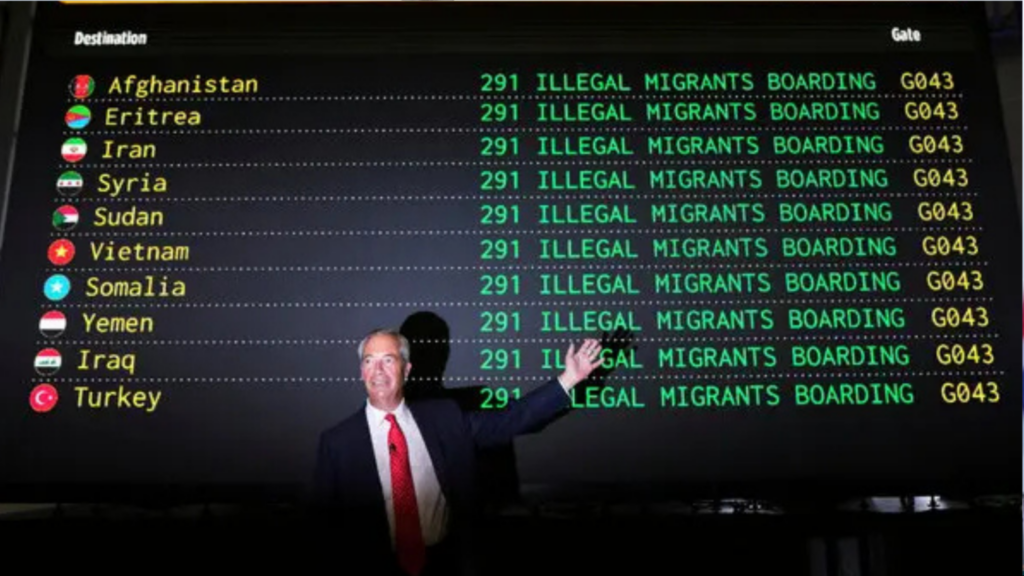Reform UK and the Politics of Exclusion
Reform’s ascent to the forefront of British politics signals a profound realignment of the nation’s political landscape. Emerging from the political fringes, the party has adeptly transformed public disillusionment with governmental shortcomings and the escalating debate over immigration into tangible power. Under its nationalist agenda, all migrants in the UK, whether recent arrivals or long-term residents, face immediate and profound precarity. Families stand to be divided as the party’s exclusionary agenda reshapes the very fabric of the nation.
Reform’s Move to the Political Centre
The May 2025 local elections marked a decisive inflexion point in British politics. Reform UK, which had never before controlled a local council, secured 677 seats, constituting 41% of those contested (Buchanan, Stiebahl & Wong, 2025) (Figure 1). Labour, by contrast, won only 98 seats, losing control of one council, while the Conservatives from contention. As Rallings and Thrasher (2025) note, national extrapolations of these results would give Reform approximately 32% of the vote. No longer a peripheral anomaly, the party now constitutes a substantive political force capable of significantly reshaping Britain’s electoral map.
(Figure 1: Rallings and Thrasher, 2025)
Immigration sits at the centre of Reforms appeal. In its Contract with You it tops the contents list, cast as an existential threat to “British culture, identity, and values” (Reform UK, 2024). Its message is unambiguous: a freeze on immigration and a vow to “stop the boats”, offshore processing of asylum claims, immediate deportation, and strict new rules around settlement (Ibid.). By elevating immigration above all else, Reform exploits hostility towards asylum seekers and migrant families, turning human lives into a political weapon and the plight of the displaced into the defining faultline of its insurgent politics.
While this logic sounds threatening in theory, its viability as policy is the real concern. Britain’s fractured political terrain could play to Farage’s advantage: post-Brexit volatility, a diminished Conservative Party, and voter dissatisfaction with Labour’s immigration measures offer fertile ground for an outsider political force. Yet populist movements can burn bright and fade fast undone by co-opted agendas or internal discord. As Francis and Roberts (2025) note, “Reform are a one-man band with no experience of government”. Nevertheless, the endurance of anti-immigration sentiment and a public appetite for political disruption suggest Reform’s momentum will not be easily contained.
What Would a Reform UK Look Like for Immigrants?
Of Reform UK’s many immigration proposals, two are especially revealing in terms of the range of migrants they would affect and thus deserve closer scrutiny here: tougher removal powers and harder routes to settlement.
Firstly, a Reform-controlled Home Office would attempt a wholesale re-engineering of Britain’s asylum regime around mass deportation. Under ‘Operation Restoring Justice’, the party has openly committed to deporting 600,000 migrants over 5 years (McKiernan & Nevett, 2025). At the legislative core of this agenda lies the proposed ‘Illegal Migration (Mass Deportation) Bill’, which would impose a legal duty on the Home Secretary to remove “illegal migrants”, ban deportees from ever re-entering the UK, and “disapply” international treaties such as the 1951 Refugee Convention – the very treaty designed to prevent governments from returning people to places where their lives or freedoms are endangered (Jones, 2025). Additionally, to further smooth these removals, Reform also proposes withdrawing from the European Convention on Human Rights (ECHR), a central pillar of UK law that has long provided the legal backstop against arbitrary state power. The ECHR has been instrumental in halting unsafe deportations; its abandonment would represent a significant rupture with post-war legal norms and Britain’s own human rights architecture (McKiernan & Nevett, 2025). Here, Reform’s proposals do not merely tighten immigration control; they attempt to redefine the very boundary of law, rights, and morality. It is one thing to pursue orderly migration management; it is quite another to strip away the legal and ethical constraints that prevent states from treating vulnerable people as disposable.
Secondly, Reform’s plans to curb immigration not only impact those trying to get into the country today but also imperil the secure futures of migrants already lawfully here. By promising to abolish Indefinite Leave to Remain (ILR), the party would strip nearly half a million legal migrants of any permanent status, trapping them in a perpetual five-year renewal cycle (Campbell, 2025). This doesn’t just tighten the edges of the system; it fundamentally tears apart the principle of settlement itself, erasing its role as a path to integration and citizenship. As Farage insists, there’s “no fair play for British people priced out of the market” by migrant labour, no matter whether those migrants have spent their lives lawfully building the very economy he claims to defend (Francis & Roberts, 2025). The party goes further still, vowing to strip those with ILR of welfare access – claiming, with little evidence, that this would save £234 billion over several decades (ibid.). The cruelty of this scheme lies not only in the bureaucratic precarity it invites but also in the contradictions it rests upon. Reform justifies abolishing ILR on the grounds of curbing benefit claims, yet most such claimants are EU nationals protected under the Withdrawal Agreement – a group explicitly exempt from Reform’s reforms (Francis & Roberts, 2025). In other words, the 430,000 non-EU migrants holding ILR are not responsible for the issues Reform attributes to them, solidifying their role as collateral in the party’s overarching anti-immigration strategy.
In short, a Reform UK would see migrants from war-ravaged nations face swifter deportation, and long-term law-abiding migrants thrown into an unjust situation of uncertainty. Clearly, the moment to heed Ed Davey’s warning is now: “Don’t let Trump’s America become Farage’s Britain.” (Davey, 2025).
Can Reform’s Momentum Be Slowed?
At a policy level, Reform’s growing popularity has emerged from a gap between rhetoric and delivery. Previous governments have pledged to repeatedly cut numbers and stop Channel crossings, only to miss targets. To blunt its appeal, other parties would need to demonstrate not just toughness but competence – investing in workable removal logistics, sustainable legal migration routes, and transparent settlement rules. In achieving this, political leadership matters just as much as policy detail. As the Conservatives tout Reform-style measures – expanding detention powers and offshore processing – to stem defections, they risk instead legitimising the insurgent narrative. Stronger leadership would reframe the immigration question around fairness, economic contribution, and rule of law, acknowledging concerns without ceding the field to maximalist rhetoric. Beyond Westminster, the long-term check on populism lies in reducing the cultural anxieties it exploits. Community-level programmes that improve integration, education that counters misinformation, and civic spaces that foster cross-cultural contact all make it harder for parties to weaponise migration fears. These bottom-up tactics call not for tougher borders, but for confronting the underlying causes of resentment at its source.
Hindsight is a privilege – and while we can still learn from the lessons of right-wing populism elsewhere, now is the moment for governments to act to curtail Reform’s worrying rise.
Bibliography
Buchanan, I., Stiebahl, S. and Wong, H. (2025). Local Elections 2025: results and analysis.
[online] House of Commons Library. Available at:
https://commonslibrary.parliament.uk/research-briefings/cbp-10272/?utm_source=chatgpt.co m.
Campbell, T. (2025). Nigel Farage Vows to Scrap Indefinite Leave to Remain – What ILR Holders Need to Know Now – OTS Solicitors. [online] OTS Solicitors. Available at:
https://www.otssolicitors.co.uk/news/nigel-farage-vows-to-scrap-indefinite-leave-to-remain-w hat-ilr-holders-need-to-know-now/ [Accessed 7 Oct. 2025].
Davey, E. (2025). Don’t let Trump’s America become Farage’s Britain. [online] Libdems.org.uk.
Available at: https://www.libdems.org.uk/news/article/ed-davey-speech-autumn-2025 [Accessed 7 Oct. 2025].
Francis, S. and Roberts, G. (2025). Reform plans to scrap indefinite leave to remain for migrants. BBC News. [online] 22 Sep. Available at: https://www.bbc.co.uk/news/articles/c930xypxpqpo.
Jones, J. (2025). Are Reform UK’s plans for dealing with ‘illegal migration’ legally feasible? | Institute for Government. [online] Institute for Government. Available at: https://www.instituteforgovernment.org.uk/comment/reform-uk-migration-policy-legally-feasi ble [Accessed 7 Oct. 2025].
McKiernan, J. and Nevett, J. (2025). Reform UK prepared to deport 600,000 under migration plans. BBC News. [online] 26 Aug. Available at: https://www.bbc.co.uk/news/articles/c5yk4r5e514o.
Rallings, C. and Thrasher , M. (2025). Rallings & Thrasher: How Reform delivered shock to two-party system. [online] Local Government Chronicle (LGC). Available at:
https://www.lgcplus.com/politics/governance-and-structure/rallings-thrasher-how-reform-deli vered-shock-to-two-party-system-07-05-2025/ [Accessed 7 Oct. 2025].
Reform UK (2024). Reform UK. [online] Reform UK. Available at: https://www.reformparty.uk/.



